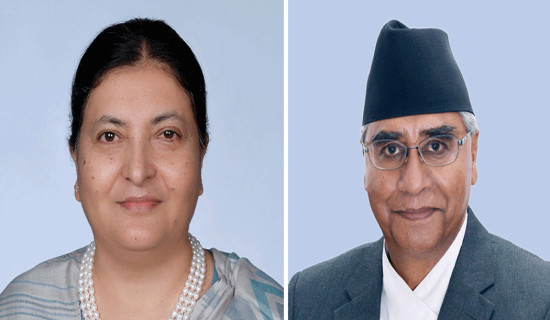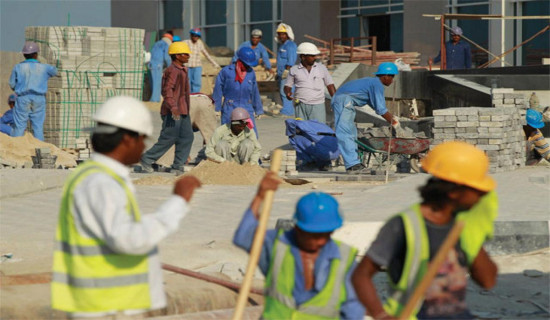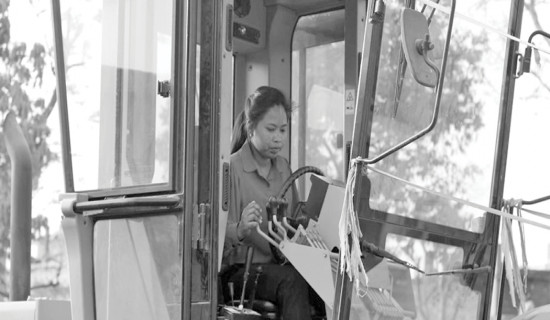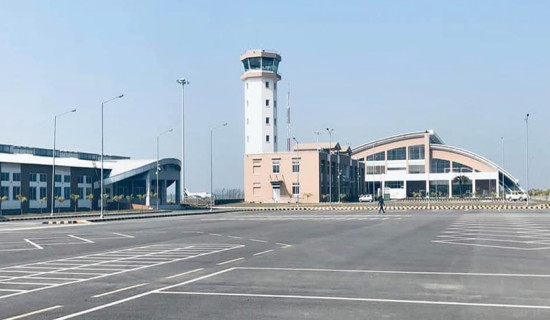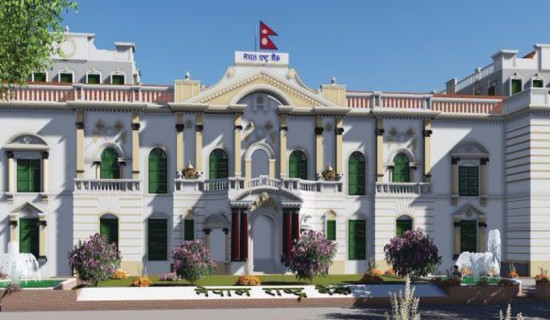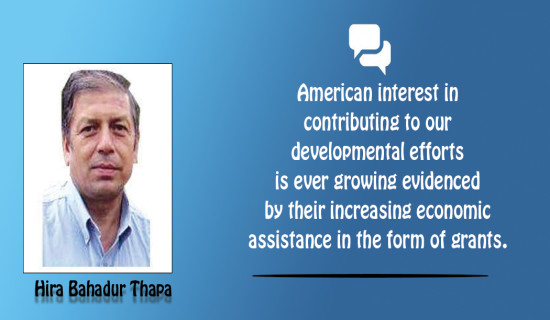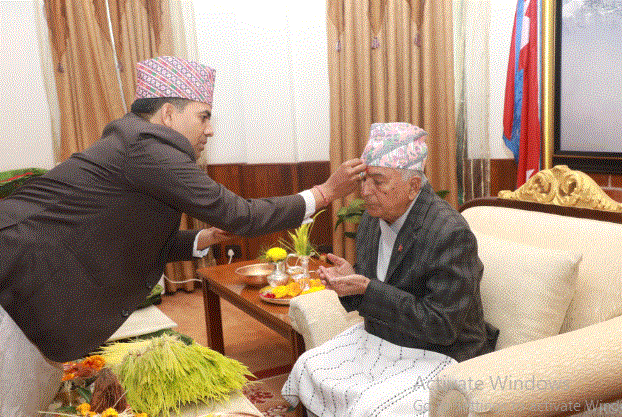- Thursday, 2 October 2025
Rebirth Of Forgotten Dramas Of Lil Bahadur
Lil Bahadur Kshyatri flew to Delhi from Assam and received the prestigious national award Padmashree there from India’s president and returned to his home at the end of 2021. He is now 91 years old. This honour from the Indian government, which the nonagenarian litterateur received, is for his contributions to the Nepali language and literature. In this regard, it would be appropriate to remember Kshyatri as a litterateur, who has also been widely known for ‘thin book with powerful theme’ since he wrote a highly popular small novel named “Basain" in the Nepali language. Thus, Lil Bahadur’s contributions to Nepali literature and language are non-stop and it is hard to measure his selfless creative devotion.
Mystical Mustang
Mustang, the last frontier of the trans-Himalayan fiefdom, is a land cloaked in a mystical veil of enigmatic parables. The facades in the upper and lower Mustang have kaleidoscopic natural rejigging. The amber-hued mountains guard the region with their majestic presence, exuding a veneered pastiche of mother nature. From its surreal semi-arid desert to motley formations of rock, snow-kissed mountains, and the stark contrast of green crop fields amidst the off-beaten landscape akin to a desert, it's a homeland of juxtaposing panorama. Opined as the "Plain of the Aspirations" in the Tibetian language, it simply oscillates with a sense of alchemy.
Promoting Mental Health
Grishma Paneru Sarita was a sophomore. She fell in love with a mysterious but attractive boy. It was a perfect relationship, until one day she felt his hand on her face. He said, "You stupid, if you were silent, that wouldn't have happened." From that moment on, her life was upset. She was psychologically, emotionally, and sexually abused. He humiliated her, talked about her being overweight, and robbed her of all her power. She began to question her self-esteem, self-confidence, and the true purpose of life. She often thought of suicide. Sarita said that was the way for her, with tears in her eyes. She didn't tell anyone at first. She was embarrassed and ashamed and couldn't say what she was experiencing. His family and friends worshipped him. He isolated her from her support system, the people who loved her and cared for her deeply. Contact with family and friends was limited. He monitored all her movements.CourageEventually, she gained enough courage and power to talk to her friends. She left him and moved with one of her friends for a while, but the abuser persuaded her to return to him. He vowed to seek counselling and anger management programmes, but he never did. He said everything was right to get her back. She truly believed in him. She gave in to another chance.No change has ever come. One day he put his hand on her neck and began to strangle her. It was like being possessed. He vowed to kill her if she left him. She saw herself dying in his hands.It was the most horrifying time of her life. It was very difficult for her to start over without him, but she decided to move forward and live again. She went to a friend who helped her contact the trauma counsellor. It took her a couple of months to recover from the trauma that she had from her husband. She went through multiple counselling and therapeutic sessions and recovered mentally and emotionally.Sarita is not the only one who has been a victim of domestic violence. Domestic violence and abuse (DVA) are major public health issues affecting the lives of people around the world. Violence against women is increasing around the world, triggered by the Covid 19 pandemic. But even before the pandemic, the World Health Organisation reported that nearly one in three women (about 852 million women worldwide) were exposed to violence at some point in their lives. According to the United Nations Population Fund, 48% of Nepali women reported experiencing some form of violence at some point in their lives, of which 15% experienced sexual violence. This happens when a partner attempts to gain psychological and emotional control over a woman by insulting, controlling behaviour, verbal abuse and intimidating the woman. There is a link between domestic violence and mental health problems. Mental health problems are a common consequence of domestic violence for both adults and children. And there are mental health issues that can make a person more vulnerable to abuse. It is perhaps not surprising, then, that a substantial proportion of people accessing mental health services have experienced abuse. Despite these strong associations, domestic violence often goes unnoticed in mental health services, and domestic violence services are not always able to assist those with mental health problems.Women who have experienced domestic violence or abuse are at very high risk of experiencing a variety of mental illnesses, including post-traumatic stress disorder (PTSD), depression, anxiety, substance abuse and suicide ideation. Physical and psychological abuse not only causes pain but also psychologically damages and increases the risk of developing mental illness in women. Fear, anxiety and sadness are the usual emotions associated with domestic violence. Although these negative emotions do not automatically indicate mental illness, the effects of trauma can significantly alter a person's memory, arousal and emotional and cognitive responses to the outside work. For many survivors, healing begins when they find that these symptoms are predictable, temporary and treatable consequences of the violence they survive. Although domestic violence and abuse (DVA) are associated with an increased risk of mental illness, little is known about the mental health of female DVA survivors seeking assistance from domestic violence services. Seeking Mental Health ServicesSurvivors should look for therapists, counselling groups and mental health services who are familiar with trauma and have experience dealing with the long-term effects of domestic violence. Treatment, counselling and support groups for survivors of domestic violence are not limited to those experiencing long-term effects such as PTSD and depression but are part of the mental health toolkit. Children affected by domestic violence can also benefit from talking to trauma-savvy professionals.We can learn about how violence and mental health problems affect those close to us on an individual level. Being there in a supportive, non-judgmental role, listening and helping in finding resources are all good ways to break down the stigma and isolation that abused women often feel. Domestic violence officers must be aware of the link between domestic violence and other adverse experiences and impacts and ensure that they respond to it. They need to hold local leaders accountable for providing support and intervention to victims/survivors and perpetrators with diverse needs (including mental health) and risks of all levels. In addition to emphasizing the mental health issues faced by victims of domestic violence, there is a need to identify multidisciplinary interventions that can provide practical and timely solutions for victims of domestic violence amid the pandemic, ranging from personalized care strategies to educational programs, escape plans, legislation and regulations, and more technology-based mental health solutions. There is a significant need for more multifaceted and multidisciplinary strategies to address domestic violence during and after the pandemic, particularly interventions that could benefit from the ubiquity and cost-effectiveness of technology-based solutions.(Paneru is a psycho-social counsellor and mental health consultant)
President, PM call to cast votes in fearless way
President Bidya Devi Bhandari has called for a joyous involvement of the citizens in the Local Level Elections 2022, saying that election is the biggest festival of democracy. Addressing the citizens through a video message on Thursday, President Bhadnari also called on the public to cast votes without an iota of fear on May 13, Stating that rule by the elected representatives is the most beautiful aspect of democracy, she said periodic election is the pillar of democracy. President Bhandari said that the elections prove that the citizens are the main source of the state power.
Qatar urges Nepali workers to collect their due remunerations
By A Staff Reporter Kathmandu, May 13: Qatar has urged the Nepali workers who had returned empty handed after serving at the Qatar-based Mercury MENA in 2017 to collect their due remunerations. Issuing a statement on Thursday, the Government of Qatar urged the remaining workers who are yet to receive their due money to contact the Embassy of Qatar in Kathmandu or Department of Foreign Employment (DoFE). They should contact either institution with the document proving their Qatari identity number and passport, said the embassy. According to the statement, Govinda Mochi, Santosh Kumar Sharma, Sanjay Chaudhary, Sakil Ahamad Musalman, Sabin Karki, Ranjit Kumar Khang, Rameshwor Mandal and Ramakant Khang can directly contact the embassy or DoFE. Other Nepalis requested to contact are Ram Krishna Niraula, Niranjan Pasman, Gyan Chand Kurmi, Brahmdev Khang Khtwe, Birendra Hajara, Baijnath Chaudhary, Ajay Kumar Shrestha, Vinod Kumar Bhar, Tej Narayan Ray Amat, Surendra Bohora, Sikandar Mukhiya, Selendra Maharan and Ram Udagar Ram. Likewise, the embassy has urged Dipendra Sarki and Dhruba Sripali to reach the embassy or DoFE with the documents. Last year, 33 Nepalis had received their due money from the company. The workers had returned penniless from Mercury MENA, a mechanical, engineering and plumbing company that operated its services across the mid-Asia and North Africa. According to a report of Amnesty International, each worker has unpaid salaries and benefits averaging over US$2,000.
Anita Tharu breaks glass ceiling to become grader operator
Anita Tharu is found digging and constructing new road track from city to village in Ghorahi. For the past four years Tharu has been driving heavy vehicle for constructions in various places including Dang. Tharu, a grader operator in Ghorahi Sub-metropolitan for the past one year, has started operating a grader for construction works carried by the metropolitan recently. She came to Dang from Bardiya and learned to operate the machine with the help of her relatives after completing her college, said Tharu. "I was unable to continue my studies due to the poor financial condition of my family, so I stayed at home," said Tharu. She informed that her brother-in-law was working as a grader operator in the construction of Ghorahi-Murkuti road at the time.
Jazeera Airways to operate flights to Bhairahawa from June 12
Jazeera Airways will operate regular flights to the Gautam Buddha International Airport (GBIA) of Bhairahawa from June 12. Jazeera, which has taken approval from GBIA, will operate the opening flight on May 16 (day of Buddha Jayanati). Nepal government has assigned May 16 as the flight opening day for the airways in the newly built second international airport of the nation. General Manager of GBIA Govinda Prasad Dahal informed that GBIA will conduct three flights a week. Jazeera has been conducting single flight per day to and from Kathmandu. According to the schedule published by Jazeera, the flight to Bhairahawa will take off from Doha of Qatar. The passengers from Qatar can have the direct flight to Bhairahawa with a transit in Kuwait. The flight will land at GBIA.
Growth of deposit collection remains low
Growth of deposit collection at the banks and financial institutions (BFIs) has remained low during the first nine months of the current fiscal year 2021/22 compared to the same period a year ago. Deposit collection by BFIs has increased by 5.1 per cent in the review period compared to an increase of 13.7 per cent in the corresponding period of the previous year, according to a macroeconomic and financial report of Nepal Rastra Bank (NRB). On y-o-y basis, deposits at BFIs expanded by 12.2 per cent in mid-April 2022.
Govt working to achieve food security
Ministry of Agriculture and Livestock Development has been preparing policy, programmes and budget for the upcoming fiscal year 2022/23 focusing on import substitution and food security by increasing productivity and production of agricultural produces.
Winning Miss Teen Crown
The moment when the crown of Miss Teen Nepal was placed on my head is still fresh in my mind. I was proud of myself, overwhelmed with joy and a strange feeling of satisfaction flowed down all my nerves. That time, I did not realise what had happened to me though I was crowned with the Miss Teen Nepal 2021 title organised by Kathmandu Jaycees.
Tips For New College Students
Heading to college for the first time can be daunting, and that’s true whether you’re attending a public four-year university or a prestigious Ivy League school. You have to get the lay of the land, make friends, and figure out how to do well in your courses all within a few weeks. And with the effects of Covid-19 still lingering in some spots, you may be stuck trying to navigate a college world that is still partly online. While convenient, the virtual aspects of higher education can make forging connections that last a challenge to say the least.If you’re a freshman who is hoping to begin their college career on solid footing, the following tips can help.1. Always Go To ClassMark Beal, who is a college professor and the author of 101 Lessons They Never Taught You In High School About Going To College, says skipping class is one of the easiest things to do, which is why too many college freshmen do it. However, this is one big mistake you should avoid.“No matter how early in the morning a class takes place or how late on a Thursday night, never skip class,” he says, adding that it doesn’t take too much to walk across campus and attend class for 80 minutes.From there, Beal says to be an active participant — as in, listen, take notes and ask or answer questions. Not only do you have the chance to learn more this way, but you never know who is paying attention to you and your actions.2. Be Proactive About Your College EducationYou may not have any idea what you want to study when you head off to college, or perhaps you have chosen a major but you’re still unsure of the way you want to go. Either way, Mark A. Herschberg, author of The Career Toolkit, Essential Skills for Success That No One Taught You, says you can spend your first year of college exploring potential majors. Go to department open houses, he says, but also sit in on a class or two in a field you’re interested in. If you find something that piques your interest, you can also find an upperclassman or professor and ask if you can stop by their lab and learn more about what they do. 3. Focus On NetworkingTammy Huang, a 10-year interviewer for Harvard Admissions and the founder of College Launch, says college freshmen should go out of their way to meet people that can help make their college experience a success. This includes getting to know your college counselor and making a plan for a pre-major pathway and general education courses. Huang also recommends forming a positive support group by joining meaningful clubs and making friends with people within your dorm or apartment community and other organizations that align with your interests and goals. Finally, Huang suggests finding a mentor by looking for a professor that has a professional background you are interested in that also matches well with your personality. 4. Take Care Of Your Mental HealthThe first year of college is an incredible time of change, and some first-year students handle it a lot differently than others. Cory Trevena, Senior Director of Education at Caron Treatment Centers, says college freshmen should learn the signs and symptoms of anxiety and depression just like they know the Wednesday specials at the cafeteria.A little anxiety, homesickness and sadness is normal as you transition into college life, she says. “But if you’re feeling hopeless for days on end or you notice a radical change in your behavior, it’s time to reach out.”5. Be Mindful About MoneyWe have all heard stories of students blowing student loans on spring break trips and clothes only to regret those choices years or even decades later. Regardless of how your college career is being funded — through a merit scholarship, through parents or with student loans — it’s important to be careful about spending and not over borrowing.Brian Gawor, the Vice President for Research at RNL (a platform company that helps colleges and universities amplify student enrollment, success and philanthropic support), says freshmen should learn to utilise what is already available and paid for at school. For example, don’t spend a ton on food and dining out while also paying for a meal plan. Also, learn about the tutoring, help with writing, and technology assistance that are available at your school. Sources: Agencies
Vital Voting Day
Today (May 13) is an important day for Nepali people as they are electing their representatives in 753 local levels nationwide. This is the second local election being held after the introduction of the federal democratic constitution in 2015. The first three-tier elections (local, provincial and federal) were held in 2017. Voters are having a valuable opportunity to vote for representatives to fill a total of 35,221 positions from a total of 145,112 candidates this year. As many as 79 political parties are in the local poll fray while a host of independent candidates have filed their nominations for different positions. There are altogether 21,000 polling booths across the nation which remain open from 7am to 5 pm.
Deepening Nepal-US Relations
Nepal and the US are happily celebrating the 75th anniversary of the establishment of their diplomatic ties this year, with a flurry of visits from Washington in the last few months. This signals that both countries attach higher significance to their bilateral relationship. As Nepal and the US decided to set up diplomatic relations in April 1947, the former had such ties only with the United Kingdom (UK).
Political Reporting During Elections
Nepali people are going to cast their votes in another local poll today after the country adopted the federal system. The much-awaited voting followed massive campaigns of the political parties and candidates and 48-hour silence period. The mass media, despite their regular role of surveillance of the political activities, are expected to abide by the directives meant for electoral silence. Hence, in principle, the electorates are supposed to decide peacefully based on the information they acquired earlier from the different media outlets and their own observations.
On Weekend Off
The government has recently taken a new decision on closing down all the public offices and all schools on Saturdays and Sundays. This decision comes amidst a fall in the country’s purchasing power and the rising cost of fossil fuels. This provision will come into effect from May 15. According to the notice published in the Nepal Gazette, the government will introduce the weekends as holidays. Summer, winter and festival holidays will also be slashed, to some extent. Half-holiday on Fridays and other public holidays will be cut off. Such changes in working days have been made to help complete bulky school curricula on time.





